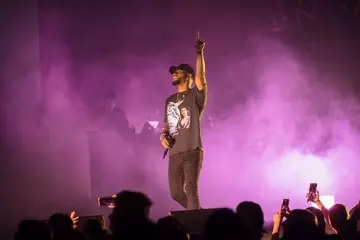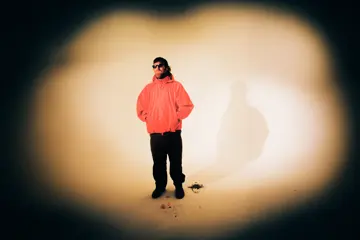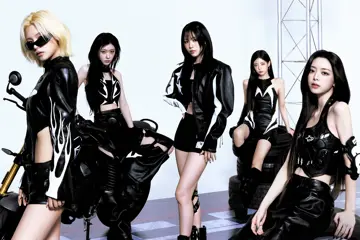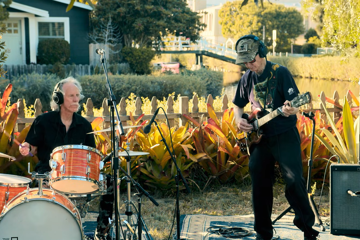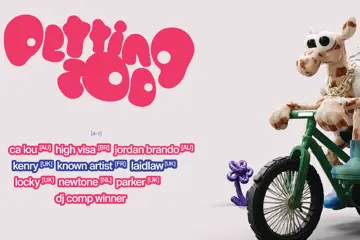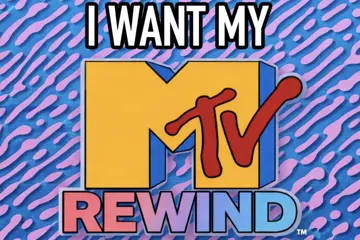THE FRONT RUNNER
★★★1/2
In The Front Runner, it’s 1987, except, well, it’s not really. Hugh Jackman plays real-life political figure Gary Hart, who was the presumptive favourite as the Democratic candidate in the 1988 election, and a man assumed to be on his way to a Presidential term. When personal scandal scuttles his campaign in a matter of weeks, it marks a historical tipping point. The film is based on Matt Bai’s book All The Truth Is Out: The Week Politics Went Tabloid, and that subtitle tells of its grand theme.
Here, director Jason Reitman essentially seeks to undertake an examination of the contemporary relationship between politics and tabloid; how a culture of coverage began to change so completely, eventually leading to the 2016 actuality where a reality TV star somehow won a Presidential race by treating an election as its own form of reality TV.
First, The Front Runner lays out our titular candidate as a serious contender driven by serious issues: by economics and the environment, by foreign trade and a thawing of the Cold War. “I intend to run a campaign of ideas,” Jackman intones, with due idealism; an old-fashioned notion that will soon seem folly. When it turns out he has a history of extra-marital affairs, there are no more issues to discuss, only a singular issue. Where, in the film’s recent past, the press cast a blind eye to the indiscretions of JFK, in this moment everything has changed, a politician's personal behaviour now the only story that matters.
Rather than a singular study of a powerful man, The Front Runner’s screenplay — by Bai, Reitman, and former Clinton press secretary Jay Carson — is a study of the machinery of politics, the many who both toil for and cover a campaign. In an insanely stacked cast, there are political workers (JK Simmons, Molly Ephraim, Tommy Dewey, Toby Huss, Alex Karpovsky, Chris Coy, Oliver Cooper, Josh Brener), journalists (Mamoudou Athie, Ari Graynor, Steve Zissis, Bill Burr), editors and publishers (Alfred Molina, Steve Coulter, Mike Judge, Kevin Pollak). And all of them are a part of the one, grand, ongoing conversation; the film a discussion piece in which its themes — press propriety, morality policing, public shaming, gossip taken as gospel, the death of notions of privacy — are spoken aloud. Lingering, loudest of all, is this essential question: does it really matter if a political candidate can’t keep it in his pants?
Don't miss a beat with our FREE daily newsletter
The Front Runner never seeks to answer any of its many questions, let alone that central one. Instead, it digs down into a complicated moral quagmire, with no intention of ever clawing its way back out. It clearly sounds a lament for the current state of political coverage, the dumbing down of discourse, and the gotcha culture of social media; portraying Hart’s swiftly-derailed campaign as a symbolic moment, presaging the eventual funnelling of politics, entertainment, gossip, and grandstanding into the internet’s all consuming feed. But it’s not a simple indictment of the current climate, nor, even, really, a cry for what’s been lost. Instead it’s a drama out to merely mark a moment of change, when an old climate gave way to a new one.
In the same way, its lead character is neither exonerated in an act of cinematic revisionist history nor indicted anew with a #MeToo slant (nor does it play him as a clown; something done, recently, in films as radically different as Josh Kreigman & Elyse Steinberg’s documentary Weiner and Paolo Sorrentino’s burlesque Berlusconi-opera Loro). Jackman’s character is a complicated, complex, contradictory figure; a man with unwavering principles in some areas, less so in others. Morality and ethics are famous grey areas, and it’s to the film’s credit that it allows them to be so.
Of course, all this is likely why The Front Runner has ultimately become its own kind of failed contender. Obviously assembled as a prime slice of Oscarbait — the 2018/19 campaign’s successor to Steven Spielberg’s The Post — it has stalled out in such hopes, never seriously gaining any awards show traction. That’s, likely, because it’s a film designed to be essentially unsatisfying; a quietly noble notion that, ultimately, seems to have doomed it to failure.
BEN IS BACK
★★★
If you only see one film in which an acclaimed new screen talent plays a teenager struggling with addiction this year, make sure it’s not Ben Is Back. Peter Hedges’ film suffers in proximity and comparison to Felix van Groeningen’s Beautiful Boy, a more complex, ambitious, artful picture anchored by a better young-star performance (by Timothée Chalamet, he of the magnetic talent/cheekbones). Where that film dances through time in a free associative fashion, evoking the experience of temporality, Ben Is Back is a strictly linear affair.
It marks two days, over Christmas, in which the titular black sheep eldest child —Hedges’ own son, Oscar-nominated young thesp Lucas Hedges— returns to the family home, on leave from a stint in rehab. His return home isn’t just an uneasy reunion, or a journey into an outside world full of temptations, it’s a grand paid penance: a chance to atone for the many sins committed in the throes of addiction. A grand, tragic event occurred in Ben’s past, and, in true Sundance-drama type fashion, you’ll have to wait around for the revelation of what this was.
Hedges is given a great role by his dad; and Julia Roberts, playing the film’s long-suffering mother, has an even better one, her character a confluence of contrary emotions, at once supportive and cynical, full of maternal concern but all too wise to the lies she’s long been fed. Hedges’ direction presses in close on Roberts’ movie-star face, catches all the feelings flickering across her expression. The score from Dickon Hinchchliffe is beautiful. And, as a cry of rage against America’s opioid epidemic, Ben Is Back has real meaning and power. But, at its worst, it also resembles a genre movie, a nocturnal thriller where mother and son must team up to thwart the evil drug-dealers that’re a menace to polite society.
THE HATE U GIVE
*Spoilers ahead*
★★1/2
Eazy E famously dismissed John Singleton’s Oscar-nominated 1991 drama Boyz N The Hood as “a Monday after-school special with cussin’”; a bit of lore that was, of course, duly recycled in the NWA biopic Straight Outta Compton. That quote lingers over The Hate U Give, an earnest portrait of the ethics of the Black Lives Matter movement and the scourge of All-American police violence against people of colour. It’s sourced from a YA novel, by Angie Thomas, and often actually really does feel like an after-school special, without cussin’. For all the profundity of its theme, this is an unalloyed message movie, one that never manages to transcend the feeling that it’s out to teach you something.
It stars Amandla Stenberg as a black girl living in the fictitious ghetto Garden Heights, whilst going to school at an upper-class prep school. She’s a teenage master of code-switching, learning how to blend in and not ruffle feathers no matter the surrounds, whilst feeling out-of-place in each environment. She even has a handsome love-interest singular to each locale: childhood friend Algee Smith, a sweet-smiling kid who’s fallen into working for the local dealer; preppy KJ Apa, forever clad in a schoolboy’s blazer-and-tie, with access to his parents’ luxury SUV. When the former is shot, in cold blood, during a routine traffic stop, the careful balance between these two worlds explodes; and Stenberg’s façade of studied, crowd-pleasing charm slowly cracks in the face of tragedy, social responsibility, and outrage at perpetrated injustice.
It’s a loaded set-up, one that taps into trenchant themes; The Hate U Give openly evoking the real life tragedies of Michael Brown and Terence Crutcher. But, for all its thematic importance and timeliness, it’s a mediocre piece of cinema; more grandstanding rallying cry than anything approaching work-of-art.
Director George Tillman Jr — who previously helmed the forgotten Notorious B.I.G. biopic Notorious and an anonymous Nicholas Sparks adaptation, The Longest Ride — is a bland craftsman: there’s an artlessness to every set-up, camera angle, framing. Dustin O’Halloran’s disappointing score is tasked with being grotesquely instructive, hammering home every mood or emotion — action sting, tension, menace, comedy, family, triumph — with heavy-handedness. The finale lays drama upon drama upon drama; a mere protest-turned-riot needing, evidently, to be upped several times over, until there’s a portentously symbolic climax re: future generations being corrupted by current hate. Oh, and there’s also recurring, pretty-shameless product placement for sneakers and carbonated beverages and cheesy snacks, making this a portrait of defiant rebellion bankrolled by corporate sponsors.
CAPHARNAÜM
★★★
Capharnaüm is another momentous message movie; one that’s probably as close as a Cannes-award-winner is going to get to an after-school special. “Life is dogshit, filthier than the shoes on my feet,” spits its hero: a 12-year-old Lebanese boy (played by a 12-year-old Syrian refugee, Zain Al Rafeea) who has — in what serves as this film’s elevator pitch — taken his parents to court, suing them for giving him a life that he never asked for. For most people, the gift of life is precious; here, it’s something to resent, a furious kid full of rage that his parents’ sexual appetites have resulted in an existence of abject poverty, acute misfortune, and Dickensian cruelty. In turn, Nadine Labaki’s film is one part oh-so-symbolic courtroom drama, one part on-the-ground picaresque, following the misadventures of a boy born under a bad sign. Whilst the film’s premise is an easy in for audiences, it makes for a weird filmmaking bargain: Capharnaüm out to chronicle a life so horrible that the person living it wishes they’d never had it in the first place.
Which means: here comes endless suffering, a flick sure to be stuck with the denigrating label of ‘misery porn’. Working with a non-professional cast in a documentary fashion, Labaki is, on one hand, out to make a socio-realist picture. But compared to the work of, say, the Dardenne Brothers, her film lacks focus, precision, moral clarity; and, weirdly, lacks genuine empathy. Instead, Capharnaüm is a film built, simply, on pity. It’s also a wild, grandstanding melodrama, ditching its observationist stretches in scenes out to shameless gin up proceedings, be they courtroom or no. The framing narrative of the courtroom is one thing, but the scenes and caricatures seemingly torn from a soap opera are another.
This makes for a movie that’s a mixed bag of wildly-varied quality. At its best, Capharnaüm features some of the most amazing child acting ever captured on screen; the desperation and determination of our protagonist evoking the child-against-the-world classics of Iranian cinema (albeit with simple parable swapped out for sweeping chronicle of abject horrors). A scene in which our 12-year-old hero attempts to convince the 1-year-old he’s in charge of looking after to ‘stay put’ whilst he heads off is harrowing viewing; the real proximity of toddler to traffic enough to freak out any parent in the audience.
But then there are the moments in, and the qualities of, the film that turn Labaki into a white knight figure: her film changing the lives of those in front of the camera; she playing the role of the lawyer suing neglectful parents on behalf of aggrieved children everywhere; and her camera, so fond of pulling away to eye-of-God overheads, betraying someone who sees themselves as an omniscient figure, occupying an all-powerful place above the fray.

